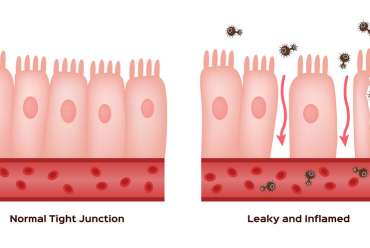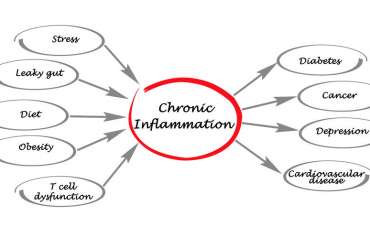By Kimberly Borghese, APRN, FNP-BC, IFMCP
A common problem of the gut that leads to many symptoms and health conditions is called intestinal permeability, or more commonly known as “leaky gut.”
Doctors have known for a long time that our gut and our health are connected. Hippocrates said all diseases start in the gut. The gut connects our outer world or environment with our inner world. Through chemical messages presented by the food and substances we ingest, our cells and DNA are given information about our environment that regulates metabolic and physiologic processes. In addition, what we ingest can directly damage our cells and DNA (or protect them). This is how food can be both a medicine and a poison and why it is so important that we put good things in our bodies.
Our gut does more than simply uptake nutrients and fluid, it also sends signals to our brain about energy balance, regulates hormones, and gets rid of toxins. Additionally, our gut provides immune tolerance to prevent allergies and defend against infection. It’s not just our bodies that are regulating these things, it is the interconnected workings of trillions of organisms in our gut working in symbiosis to bring us balance and health.
Our gut has been called our second brain as there are just as many nerve connections in the gut as in the as the brain. In addition, the gut is the center for the production of many neurotransmitters that affect our behavior and mood. The gut is also the center of most of our immune system. Because so much of our health is centered in our gut, functional medicine practitioners find that the gut is almost always a good place to start when addressing a person’s medical conditions.
What is Leaky Gut?
Everyone is talking about it, and for good reason. Thanks to our modern lifestyle, poor food quality, and toxic and stressful environments, nearly everyone has it to some degree. Even though we see many people with leaky gut suffering from intestinal symptoms and conditions there are many conditions that stem from the gut that often do not have symptoms in the gastrointestinal system.
In a healthy gut, the cells that form the barrier have healthy villi and tight junctions between the cells. Irritating or inflammatory substances, foods, organisms can damage these cells and junctions, poking tiny holes through the barrier and allowing things that should not be seen by the blood stream and immune system to pass through. This activates the immune system that sits in defense at the gut lining to protect you from any offense.
Why is a healthy guy it important?
When the immune system is constantly being activated it can become dysfunctional and not turn off when it’s supposed to causing chronic inflammation and immune imbalance. In those who have a hereditary predisposition toward immune dysregulation, an environmental trigger can cause increased intestinal permeability that leads to autoimmune disease. When our immune systems are activated, they send inflammatory chemical messages that activate immune responses in areas that are often distant from the source. For example, when you are sick with a cold or flu, you ache all over and your brain is tired and foggy. This is because those immune chemicals are felt everywhere. When we have leaky gut, we also have leaky brain and leaky blood vessels. Because of this, leaky gut is associated with inflammation in the cardiovascular system that leads to high blood pressure and atherosclerosis and to inflammation in the brain that can lead to problems with cognition.
Without a properly functioning intestinal lining we are not able to absorb nutrients. As you can imagine, this leads to a number of problems and can cause of vicious cycle of degeneration.
How do you get leaky gut?
Here are several things that damage or prevent tissue repair of the intestinal lining that contribute to intestinal permeability. You can see from this list why so many people have it.
- Stress
- Toxins (alcohol, chemicals, heavy metals, environmental pollutants)
- Drugs and medications (ibuprofen, steroids, antibiotics, aspirin)
- Allergenic foods (gluten, casein, corn, soy, lectins, etc.)
- High fat-high sugar foods
- Poor digestion
- Nutrient depletion
- Imbalanced or infectious microflora (bacteria, yeast, parasites, viruses)
- Small bowel bacterial overgrowth (SIBO)
- Low digestive acids and enzymes
- Low oxygen levels (which can happen with strenuous exercise)
- Advanced age
 Chronic inflammation and leaky gut can also be associated with heart burn, hot beverages, ulcers, H. pylori, gastritis, Crohn’s disease, NSAID enteropathy, and ulcerative colitis.
Chronic inflammation and leaky gut can also be associated with heart burn, hot beverages, ulcers, H. pylori, gastritis, Crohn’s disease, NSAID enteropathy, and ulcerative colitis.
When the mucosal and cellular barrier of your gut is broken, your immune system is exposed to things such as endotoxins, lipopolysaccharides, proteins, bacteria, and fungus causing systemic inflammation that can lead to several downstream conditions depending on your unique predisposition.
How do you know if you have leaky gut?
You may have gastrointestinal symptoms but often many people do not, which makes identifying the gut as the problem seem counterintuitive. The most common conditions people have who have leaky gut are: allergies and food sensitivities, autoimmune disease, inflammatory bowel disease, inflammatory skin conditions, mood issues and autism.
What are the symptoms of leaky gut?
The most common symptoms are:
- Allergies
- Joint pain
- Chronic sinus problems
- Headaches
- Skin problems (acne, rosacea, eczema)
- Fatigue
- Nutrient depletions
- Constipation, diarrhea or bloating (IBS)
- Anxiety and depression
How do you test for it?
There are several blood tests that can help determine if a person may have intestinal permeability. None of these tests are 100% conclusive individually but when combined with symptoms, history, and a combination of tests, we can increase our confidence in the diagnosis. We can test for Zonulin, Zonulin antibodies, or do a mannitol/lactulose test. It is also useful to get an IgG food sensitivity test, a nutritional test to evaluate organic acids and deficiencies, and a stool test.
What are the treatments for intestinal permeability?
At Zenestar we use a Five R Gut Restoration program.
1. Remove: Get rid of the things that are negatively affecting the GI tract like allergenic foods, infections or overgrowths of yeasts, bacteria, or parasites. Basically, make sure none of the causes in the preceding list of causes is a problem. We use various forms of eliminations diets, herbal supplementation and medication as needed, as well as stress reduction programs.
2. Replace: We add back the things your system needs like digestive enzymes, HCL acid, and nutrients.
3. Reinoculate: We support the GI system with helpful bacteria, prebiotic and probiotic foods.
4. Repair: Depending on your presentation and test results, we tailor a personalized combination of nutrients and herbal supplements such as fish oil, glutamine, zinc, and more to heal the lining and mucosal barrier of your GI tract.
5. Rebalance: We help you make good lifestyle choices that includes sleep, exercise, and relaxation to help bring not just physical but emotional and spiritual balance to your life.
Help is here. If you have a concern that you may have leaky gut or perhaps have a condition that you believe is associated with intestinal permeability, we can help you discover the factors contributing to it, order tests, and develop a therapeutic plan to correct it. Call or book online.
Taking new patients from Las Vegas, NV, Henderson, NV and surrounding areas.

